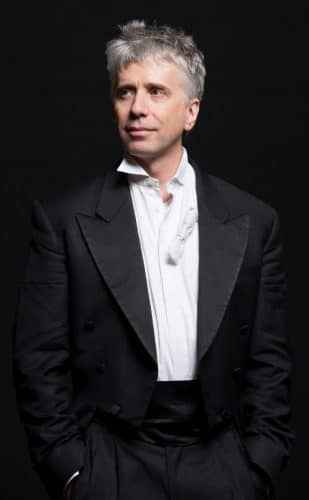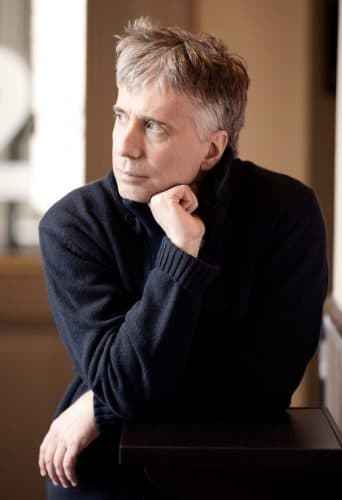
Giovanni Antonini Xecutives.net Interview, Photo: Marco Borggreve
Giovanni Antonini, 1965, born in Milano, is an Italian flutist and conductor and co-founder of the chamber orchestra Il Giardino Armonico. Antonini has put his focus on Baroque music and authentic performance practice, a modern musical approach that was developed long ago by Nikolaus Harnoncourt. Giovanni Antonini, his chamber orchestra Il Giardino Armonico and singer Cecilia Bartoli were awarded with a Grammy for the 1999 recorded Decca Classics-Vivaldi Album («Vivaldi opera arias by Cecilia Bartoli»). The recording of Beethovens Sinfonies with the Kammerorchester Basel was enthusiastically received by classical audiences everywhere as a masterwork. Giovanni Antonini is an acclaimed guest musician and conductor in Switzerland who has worked with the most renowned orchestras and great musicians from all over the world. With the Händel-opera Alcina performed at the Zurich Opera House he recently achieved sensational results. In the interview with Christian Dueblin, Giovanni Antonini talks about his musical career, authentic performance practice, his approach to conducting and his personal spin on Nikolaus Harnoncourt’s innovative musical interpretation technique of classical music.
Dueblin: Mr. Antonini, you have become a welcome guest musician and conductor, not only here in Zurich, where you are conducting Alcina at the Zurich Opera House, but also in other music metropolis such as Berlin, Paris, as well as at lots of festivals all over the world. What are your earliest memories regarding music, and how did you discover your special interest for Baroque music?
Giovanni Antonini: My father always listened to classical music. I did not start becoming interested in music and playing music myself that early on. But I always listened to good music. It took me some years until I learned an instrument myself. An important impetus for being more and more interested in classical music was a good friend of my family who used to come over to our house. He was a famous conductor, musician but also a producer at that time. He worked as a producer for Philips. Sometimes he brought new tapes and showed us new music. He let us listen to the English conductor Colin Davis’s pieces and music of ‘I Musici,’ back then a famous Italian chamber orchestra, which got famous because of its interpretations of Antonio Vivaldi’s music. Those musical visits were very interesting for me, and I grew very fascinated by the music and the conductor’s explanations.
Dueblin: Later you started playing the flute, an instrument that you also make use of while conducting, for instance, Alcina at the Zurich Opera House. How did it come that you decided this instrument?
Giovanni Antonini: Yes, I started to play the Baroque flute, the so-called recorder. When I was about 7 or 8 years old my parents wanted me to play the violin, but I did not succeed at an examination at the Conservatorium in Milano. The Conservatorium explained to my mother that I would be too lively (in Italian «vivace»). I probably did not show too much of a musical gift back then. But looking back, this was finally a fortunate coincidence, a blessing in disguise. Playing the recorder I went to another conservatory in Milano and there I found this incredible world of Baroque music. I found my own, very personal, way, not an academic method, to master this instrument. This personal approach was a very interesting experience that later on had great influence on my work as a conductor, for which one has to find one’s very own way of expression.
Dueblin: Did you have, besides the conductor you have mentioned, a kind of mentor, somebody who helped you develop yourself musically?
Giovanni Antonini: Not really. I went to school very early and I was not a very good pupil. But in the field of music that was different. I learned music very fast. The repertoire of the recorder is mainly in Renaissance and Baroque music. I started playing the recorder and I became very interested in Baroque music, when a back-to-the-roots music movement started in Italy. There were a lot of expectations, but also a lot of freedom playing Baroque music. If, just for instance, somebody starts playing the piano, there are dozens of models you can copy or follow. In a certain manner that makes life difficult for a musician. If he does not have a strong personality, such models can push one down and overwhelm a person, which has a negative impact on his skills to express himself. In the field of Baroque music lots of things were still to invent. That was the great thing for me, which motivated me to experiment and educate myself.
Dueblin: It is interesting, and it reminds me of an interview with Dorothee Oberlinger, another world famous flutist. She explained to me that she loved the improvisation element of Baroque music, which gave her the chance to find her own way of musical expression and interpretation.
Giovanni Antonini: That is an interesting point for most of the musical field who are dealing with Baroque music. You can also find improvisation elements of music in the Romantic era. Beethoven, Liszt and Mendelssohn, for example, were great improvisers. Until the beginning of the 20th century improvisation was very normal to musicians and composers. Bach was the best improviser ever. Then something happened, which is not easy to explain. Classical musicians lost the gift of improvisation, step by step. If you ask classical musicians to improvise, they can be scared or even terrorised. Improvisation does not fit into the learning mind-set of lots of musicians.

Giovanni Antonini (c) Giovanni Antonini
Dueblin: How do you explain this development in music?
Giovanni Antonini: To improvise assumes that you can do mistakes. Without taking the risk of making a mistake, one cannot improvise. Both improvising and not making mistakes are incompatible. In our world technical aspects have become so important to lots of musicians and the audience that musicians can no longer allow themselves anymore to commit a mistake. But without having the possibility of making a mistake, you cannot take risks and you cannot improvise or do something totally new. It’s a little bit like being in a company that is working on a new product. You cannot get to a new product without mistakes and failures. Asked about how he found his way of improvisations through making mistakes, Miles Davis himself said that he did not perform so many good improvisations on his instrument. But it’s not about the mistakes, it’s about expression and finding new ways of musical interpretation.
Dueblin: Modern musicians, as they get more and more interested in how music was really played in the past, examine and explore lots of parameters that were important in the past.
Giovanni Antonini: Just open a Vivaldi or Monteverdi score, or even one of older composers. Those scores sometimes seem to be very poor and simple. Those composers gave only some exact points, like cornerstones, to the musicians and interpreters of music. They wanted them to have the space of improvisation. Today we try more and more to discover what is not written down, and that is no easy task. The most important thing we have to understand is that the language of music back then compared with nowadays was more or less the same. Of course, Vivaldi and Corelli had different styles, but within a common frame, the same language of music. It was a unique language back then compared with today. We live in a world with very different languages of music expression. Think about modern music, about Jazz, Rock, Pop and Rap. There are many very different things, all part of our culture and widely accepted. A musician, who wants to play as close to the idea of a composer back then, has to learn about the historical language of evolving notation and about the codes. It is not easy to find those music codes. The combination of knowledge, and musicians’ fantasies, is fascinating. This combination makes music alive in the moment it is played.
Dueblin: You co-founded the Baroque ensemble Il Giardino Armonico back in 1985, at the age of 20. This period instrument ensemble has become very famous and you are still an active member of the orchestra, also conducting it. The 1999 recorded Decca Classics Vivaldi Album (Vivaldi opera arias by Cecilia Bartoli) was, and still is, a great success. How did it come about the collaboration between you and the orchestra and superstar Cecilia Bartoli, and what is the secret for your success with Il Giardino Armonico even after 30 years of playing music?
Giovanni Antonini: We were three musicians in 1985. We had already recorded a lot, in particular Vivaldi’s Four Seasons, when we were contacted by the Italian singer Cecilia Bartoli. She was thinking of producing concept albums with composers such as Vivaldi, Salieri and Gluck; Cecilia Bartoli’s idea of beginning with an album of only Vivaldi arias, together with our experience of such music, proved to be a perfect plan: the “Vivaldi Album”, produced by Decca, was a great success, awarded with a Grammy. The collaboration between the orchestra and Cecilia Bartoli opened doors to add another kind of public to Il Giardino Armonico. The orchestra was noticed by those who love voices of great singers. The CD demonstrates that Il Giardino Armonico was not only accompanying orchestra but also an ideal partner for Cecilia Bartoli. I think that is the key to the tremendous success of this production.
And yes, Il Giardino Armonico is a very experienced orchestra that has grown very steadily, always focusing on the quality of music. Its success is the fruit of years of constant, longstanding and steady work. At this level of musical attainment, it is very difficult to maintain high quality over years. Such quality can only be achieved with a lot of time and passion. It would certainly be much more difficult to start an orchestra like Il Giardino Armonico at present. This has to do with the time factor. Everything is going on much faster than in the past. It would be very difficult to develop as Il Giardino Armonico did in the last 30 years. It is no secret that like many other organisations, also the record producers, are under economic pressure. Musicians are more and more worried about their economic situation and their careers, which I can understand.

Giovanni Antonini (c) Giovanni Antonini
Dueblin: Not too long ago some music directors behaved like managers of organisations, or even dictators and the orchestras tended to be very large and pompous. How would you personally describe your own approach to conducting? What experiences did you personally take in the past as a conductor and musician?
Giovanni Antonini: Each orchestra is an own world with its own principles and there were some conductors with very big egos and strict ideas and concepts. But I would not say that those conductors are ‘dictators’. Even Il Giardino Armonico and the Kammerorchester Basel, both dealing with authentic performance practice, are totally different. Each orchestra is its own organism, you have to understand this. It is not easy for conductors to realize how such ‘organisms‘ work, particularly if a conductor only has two or three days time to get to know the orchestras. A conductor might arrive with his musical concept, his psychological concepts and ideas, and all of a sudden he realises that those concepts do not work. In such a situation, one has to find ways to make his musicians produce good art, good music, and therefore the conductor needs a lot of experience.
An orchestra can be toward a conductor quite critical, as a board can be toward a CEO in the entrepreneurial world. If you cannot convince the orchestra of a certain idea, it might well reject a conductor. That is what I have learned in the last couple of years, how to understand immediately which way and which method is the best. To come back to the ‘dictators‘ as you called them: some musicians ask for very clear ideas. They want to be instructed very precisely and they are waiting for the conductor‘s explanations. If the conductor‘s ideas are good and the orchestra understands and accepts his ideas, the orchestra will make great efforts and give the conductor its full support. Then he can experiment, change rhythm and play with the dynamics, which is wonderful. That is when the chemistry between the conductor and the musicians is very good. But if he cannot convey his idea or if the musicians do not believe in his concept, it can happen that the orchestra rejects the conductor, like a manager can be rejected in an organisation.
Dueblin: What about the orchestra itself? What characteristics, apart from the techniques and skills of the musicians, must it possess so that you feel confident while conducting?
Giovanni Antonini: It can happen that an orchestra has a particular internal problem. That is not easy to handle for a conductor at all. The said ‘organism‘ can be unhealthy because of lots of reasons. There can be conflicts with the management or even conflicts between the musicians. This has certainly a bad effect on the music itself and musical expression. I can immediately feel such a problem. It is also very important to show to each musician that he is important and a part of the orchestra. In big orchestras it can happen that a musician is only treated like a number. Such an impression should not occur and it is the conductor’s task to encourage the musicians and convey that everybody is important. Besides, it is interesting to see that one person in an orchestra, who is filled with bad energy, has the same value as ten musicians who are in a positive and constructive mood. So the conductor must have an interest in encouraging the musicians.
The public can see much more than we use to think. I say ‘see‘ and not only ‘listen‘. A musical concept is not only good because the audience is listening to it. The public can see the conductor the musicians and the surroundings – such as here in Zurich at the Opera House, a great and very beautiful opera. If an interested person only wants to listen to music, he or she can listen to a CD. But people come to see a concert because they also want to look at the energy of the musicians and grasp the atmosphere of a great music event.
Dueblin: Is power also an instrument, to convince an orchestra or is it only persuasion?
Giovanni Antonini: I think that there are orchestras that need to feel some power of the conductor. As I said, some musicians want to be instructed very clearly, so the power is not a problem. I remember a quite important orchestra from which I was invited as conductor. At the very beginning I felt something negative and unhappy, something that was not easy to explain but which had a very bad influence on the music concept. I stopped conducting and told them that I would go home. Some people of the orchestra were very surprised by this reaction and they asked me to stay. My announcement to go home seemed to awaken some musicians out of their negative trance. They suddenly begged me to stay and within minutes, the whole atmosphere changed completely. I work with respect and persuasion but sometimes an orchestra or musicians have to notice also the conductor’s personal power.
Dueblin: You are actually performing Alcina at the Zurich Opera House and you stand where Nikolaus Harnoncourt also stood a lot of times, a musician and musical pioneer who very early dared to go totally different musical ways. What was his role in the field of authentic performance practice in your opinion?
Giovanni Antonini: Oh yes, Harnoncourt changed the musical vision of classical music completely. He is not only a pioneer; he was and is a visionary. After Harnoncourt, classic music cannot be seen like it had been seen before his innovation. He changed the point of view of music. Let us look at a score of Vivaldi: people had looked at it, like looking at a book. But Harnoncourt took that book and changed the angle of looking at the book and he was able to read new content. He looked at it from the side, as well as upside down. He saw other things. Harnoncourt had a strong influence even on people who hated him. There was a time he was either hated, or not.
Dueblin: How do you explain some reactions of critics and musicians when it comes to authentic performance practice? There are still heated discussions going on. Is it fear that makes people react very emotionally when talking about the sources of music and original ideas of the composers?
Giovanni Antonini: It is a mix of a lot of things. No one can say in such a field of music that he is right, not even Harnoncourt. We will never know with absolute security how Bach or Vivaldi wanted their music to have been interpreted. We have the scores, but there are so many parameters that come in, and sometimes we do not know a lot about those parameters. Our taste and our experience have a great influence of how we consider music. Taste can change, it changes when you are a child, or when you are married. Therefore it is interesting to listen to older records. Thirty-year-old records can be very strange to a musician here and now, but back then, it was considered fantastic.
So I think that many people do not realize that their personal history has a big influence on their tastes and opinions. That can result in a state in which people do not have doubts anymore. They are too convinced of their own ideas. I personally do not think that everybody has to be happy with authentic performance practice. Somebody might say that his taste is this and that, but this should not result in a situation in which somebody rejects actively everything that is new. But we have to understand that Harnoncourt was shocking to some people and considered unclassical. If you listen to the Four Seasons of Vivaldi recorded with Harnoncourt one can understand that this might have been shocking for some conservative lovers of ‘classical‘ music. The beauty of sound is not absolute anymore. The beauty of music lies in its expression, that is Harnoncourt’s concept. Within the expression it can be that bad and ugly sound is useful, but which is a very unclassical concept. That is a Jazz and Rock concept, music fields that have been using such concepts for a long time. Think about Miles Davis, who produces strange shrieks with his trumpet or Michael Jackson who shouts out in a very special manner into his microphone. That is widely accepted and gives the music its particular expression, which contributes to the beauty of the whole piece. It is like in life generally, only good music or good food for instance can be very boring. Who wants to eat caviar every day? Sometimes it is also great to eat pasta or a pizza.
Dueblin: Dear Mr. Antonini, thank you very much for the time you have taken to conduct our interview. I wish you all the best, and many great performances as a conductor in the future.
(C) 2014 by Christian Dueblin. All rights reserved. Other publications require the author’s explicit consent.
______________________________
Links
– Wikipedia (German version)
– Wikipedia
– Homepage
– Kammerorchesterbasel: „Beethoven 7 & 8“






